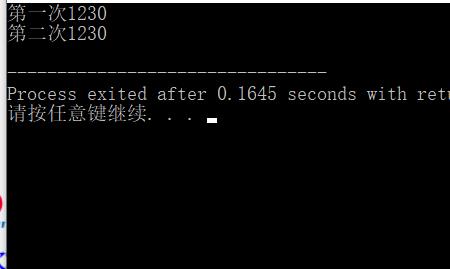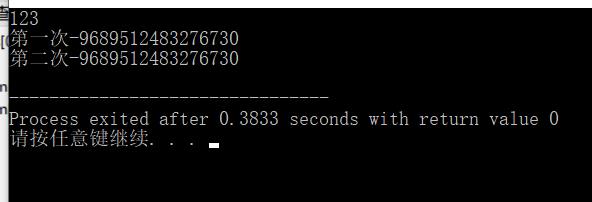C语言函数如何正确返回数组?
Posted “逛丢一只鞋”
tags:
篇首语:本文由小常识网(cha138.com)小编为大家整理,主要介绍了C语言函数如何正确返回数组?相关的知识,希望对你有一定的参考价值。
一个错误的例子
#include<stdio.h>
int* function(){
int a[5];
a[0] = 1;
a[1] = 2;
a[2] = 3;
return a;
}
int main(){
int* b;
b = function();
// printf("123\\n");
printf("第一次%d%d%d%d\\n",b[0],b[1],b[2],b[3]);
printf("第二次%d%d%d%d\\n",b[0],b[1],b[2],b[3]);
}
程序运行结果

接着把注释掉的那段代码取消注释
程序运行结果

难道就因为加了一句话printf("123\\n");,就出错?可是我除了输出啥也没干啊!
实际上我们返回数组的方法是错误的,问题的根源在于:
我们在function函数中,定义局部变量a,返回的是a的地址,而a是一个局部变量,当函数调用结束时,局部变量中数据可能已经不复存在了。
方法一:函数外初始化数组
#include<stdio.h>
int* function(int* a){
a[0] = 1;
a[1] = 2;
a[2] = 3;
return a;
}
int main(){
int a[10];
int* b;
b = function(a);
printf("123\\n");
printf("第一次%d%d%d%d\\n",b[0],b[1],b[2],b[3]);
printf("第二次%d%d%d%d\\n",b[0],b[1],b[2],b[3]);
}
为什么这样就可以了呢?
事实上,我们先在主函数中声明了a,相当于已经分配了一块固定的内存,然后将其地址传入,经过一番操作,再将地址返回,a的内容依旧还是那块内存,不会像之前那样作为局部变量被撤回。
方法二:使用static数组
静态数组的生命周期贯穿整个程序,所以我们可以在函数内部创建一个静态局部数组,操作后再返回,这种方式数组的长度必须是函数内确定的。
#include<stdio.h>
int* function(){
static int a[5];
a[0] = 1;
a[1] = 2;
a[2] = 3;
return a;
}
int main(){
int* b;
b = function();
printf("123\\n");
printf("第一次%d%d%d%d\\n",b[0],b[1],b[2],b[3]);
printf("第二次%d%d%d%d\\n",b[0],b[1],b[2],b[3]);
}
方法三:将数组包裹在结构体中,返回结构体
数组包裹在结构体里面,然后返回结构体的一个实例。
因为结构体成员使用的是深拷贝(deep copy),所以这个方法能够有效。
#include<stdio.h>
struct Witharray{
int a[5];
};
struct Witharray function(){
struct Witharray test1;
test1.a[0] = 1;
test1.a[1] = 2;
test1.a[2] = 3;
return test1;
}
int main(){
struct Witharray test1 = function();
printf("%d%d%d",test1.a[0],test1.a[1],test1.a[2]);
}

以上是关于C语言函数如何正确返回数组?的主要内容,如果未能解决你的问题,请参考以下文章